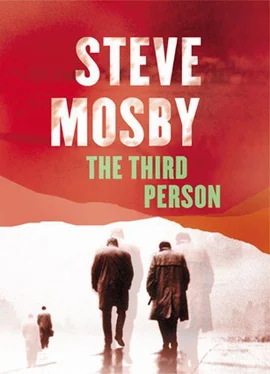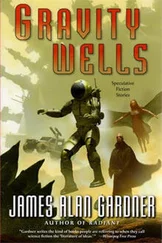Steve Mosby - The Third Person
Здесь есть возможность читать онлайн «Steve Mosby - The Third Person» весь текст электронной книги совершенно бесплатно (целиком полную версию без сокращений). В некоторых случаях можно слушать аудио, скачать через торрент в формате fb2 и присутствует краткое содержание. Жанр: Триллер, на английском языке. Описание произведения, (предисловие) а так же отзывы посетителей доступны на портале библиотеки ЛибКат.
- Название:The Third Person
- Автор:
- Жанр:
- Год:неизвестен
- ISBN:нет данных
- Рейтинг книги:3 / 5. Голосов: 1
-
Избранное:Добавить в избранное
- Отзывы:
-
Ваша оценка:
- 60
- 1
- 2
- 3
- 4
- 5
The Third Person: краткое содержание, описание и аннотация
Предлагаем к чтению аннотацию, описание, краткое содержание или предисловие (зависит от того, что написал сам автор книги «The Third Person»). Если вы не нашли необходимую информацию о книге — напишите в комментариях, мы постараемся отыскать её.
The Third Person — читать онлайн бесплатно полную книгу (весь текст) целиком
Ниже представлен текст книги, разбитый по страницам. Система сохранения места последней прочитанной страницы, позволяет с удобством читать онлайн бесплатно книгу «The Third Person», без необходимости каждый раз заново искать на чём Вы остановились. Поставьте закладку, и сможете в любой момент перейти на страницу, на которой закончили чтение.
Интервал:
Закладка:
‘Cloud what over?’
I shrugged.
‘The fact that we work for something intrinsically evil. In a benign way, if that makes any sense. We spend our days fucking good people out of their money. That’s the reality. The appearance is that you make me coffee in the morning, and we have a laugh, and we take the piss out of Williams behind his back. We’re okay people. I mean, we are okay people.’
‘Well, yeah.’
‘We take our cheques at the end of the month, and that’s the only important thing.’
‘Everybody’s got to eat, Jason.’
‘Yeah, everyone’s got to eat. Exactly.’ I sat back, listening to the cars shoot past outside. ‘Everybody has to eat. So it’s all okay.’
‘Is that why you’re not coming back? Because of this.’
‘No,’ I said. ‘Well, not really. Maybe a bit. If Amy was here then I’d still be in work; still carrying on like before. But she isn’t, and it’s put things in perspective for me. It’s a waste of our fucking time to be doing something so worthless.’
That was an understatement, but I couldn’t describe it any better. The thing is, a working life is one of those things you’re taught to respect and admire. Because a man pays his way. A man supports his family. There’s no such thing as a free lunch. And so on. In reality, what you have are thousands of people doing the same thing, day after day, and it’s not admirable: it’s tragic. It’s just a convincing fiction. So for a while after she disappeared, I shuffled back to work, all the time knowing deep down that the most important thing was Amy and the fact that she wasn’t with me. It got harder and harder, as though I was tied by elastic to something in the past, and each day was one miserable footstep forwards. So I stopped going in – just made the decision one day – and it felt like an enormous weight had been lifted off me.
I felt like I had a purpose again.
I felt like I was looking at the scenery, for once, rather than just speeding past.
What I didn’t feel was guilty, worthless, small, tragic or pitiful. For the first time in years, it felt like I’d taken hold of my life by the scruff of its neck, like a spitting, scratching cat, and turned its angry face around to have a good, honest look into its eyes. If I ever let go I’d have myself slashed to shit, but that didn’t feel important: whenever you grab a tiger by the tail, you know you’re going to get scratched eventually. You don’t take it as a career path. It’s not a long-term thing. It’s just an awesome thing.
‘Are you looking for her?’ Charlie said.
‘As much as I can. I have a friend who helps me. We’ve made some ground.’
‘What about the police?’
‘No.’
‘No?’
‘They won’t help.’ I sipped my drink. ‘She left a note.’
We spent the next year of University doing exactly the same things: getting drunk, jumping up and down in time to loud music, grinning, fucking and hanging around, as though life was a bus we were waiting for that wasn’t due for a while yet. Certainly, looking back, I have a tendency to see it as a time in my life when nothing felt urgent or pressing, and when everything seemed fun and new. The week would see casual study. The weekend would find us in pubs and in clubs, or propped up in single beds: logged on to illegal internet movie channels, the monitor flashing harsh light around the dark bedroom as we tucked into takeaway pizza and drank bottles of cheap Cabbage Hill vodka mixed with superstore cola.
The third year of University – our second as a couple – we moved in together and started The Collection. Crockery and cutlery. Pans and dishes. Furniture. Posters and paintings. Mutually agreeable albums, videos and friends. All sorts of things that didn’t exactly belong to either of us, but to this weird new thing called both of us.
You start The Collection because you have to, of course, but it always struck me that there was more to it than that. It’s like your relationship is a very beautiful, delicate cloth that either of you could accidentally blow away and ruin at any time, and the more stuff you pile on top of it – to weigh it down – the less likely that is to happen. So that’s what we did. We put our new stereo on it. We put the signed Kimota hardback anthology down. And so on. We put a hundred things on top of it and then a hundred more, and with each came the knowledge that if we wanted to do anything so dumb as to blow that cloth away, we’d have to move our friends and our books and our casserole dishes first, and then we’d have to figure out where to put them.
We both graduated. Our parents’ houses have very similar pictures in them on the mantelpiece: Amy and I, side by side, dressed in our black gowns and holding our degree certificates. Apart from our smiles, we look like we’re in mourning. During the ceremony, along with a handful of others, we’d both worn A3 sheets of paper on our backs, denouncing the University’s investment in various overseas arms companies, but our parents had made us take them off for the photographs. I guess it wouldn’t have made for a nice picture. We did it to keep them happy – rebellion was okay so long as it was nice and controlled. The kind of rebellion that you can probably brand a pair of sneakers on, but not the sort that ever achieves much.
Jobs followed. Neither of us knew what we wanted to do, beyond paying the rent. Everybody has to eat, right? I got my job at SafeSide early on, starting off temporary in the mail room and ending up – lied to by all those capitalist fairytales – just one floor up, earning a couple of hundred more a year. Small town boy makes average. It’s difficult to make a movie on the strength of that one, isn’t it? Amy panned around a little longer, but still didn’t find any gold. She worked for the post office, for a while, helping to facilitate the downsizing, and then drifted through e-centre work before finally settling into virtual secretarial support. The idea was that companies on the other side of the world could send you work to do – accounting, typing, website work – at the end of their working day (which was the beginning of yours), and when they arrived back the next morning, you’d have done all the work during their night-time. By the time I asked her to marry me, Amy had built up quite a respectable client base of Australian companies, and was thinking of expanding her business by farming work out. I was doing okay by then, too, in my own way, and so it seemed like a good time to make the commitment.
Hardly anyone got married anymore, and we really hadn’t been planning it. I’m not Radically Opposed, the way that a lot of young people are; I knew it smacked of ownership of women, and outdated beliefs in gods we just didn’t need anymore, and yet I still found it symbolically appealing. But I wasn’t at the other end of the spectrum, either – the one where you get seriously married in the top-floor chapel of your chosen company. These days every major company has a licensed CEO, and all that changes from business to business is the logo in the corner of the certificate. I knew I could have got married as a SafeSide employee. But I didn’t want that either: I wasn’t a lifer. I just wanted to put a ring on Amy’s finger, so that she could look at it every so often and know what it meant.
It’s difficult, when you have principles, to know what the right thing to do is. We didn’t want to get properly married – formally, in a registry office – but we both had friends who were getting married as some kind of retro-fashion statement, and we didn’t want to be associated with that, either. So in the end we both agreed that it was no big deal. We’d wear a ring, and in our hearts we’d see ourselves as married. I got down on one knee, unclipped this pissy little green velvet box and asked her, literally, for her hand. She gave it to me. We smiled a lot, and made nervous phone calls to the people who cared. And that was that. We never said husband or wife . We were just us: Jason and Amy.
Читать дальшеИнтервал:
Закладка:
Похожие книги на «The Third Person»
Представляем Вашему вниманию похожие книги на «The Third Person» списком для выбора. Мы отобрали схожую по названию и смыслу литературу в надежде предоставить читателям больше вариантов отыскать новые, интересные, ещё непрочитанные произведения.
Обсуждение, отзывы о книге «The Third Person» и просто собственные мнения читателей. Оставьте ваши комментарии, напишите, что Вы думаете о произведении, его смысле или главных героях. Укажите что конкретно понравилось, а что нет, и почему Вы так считаете.












